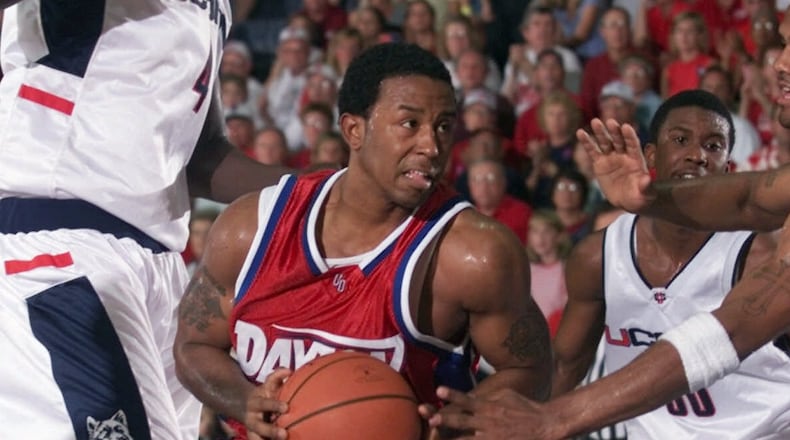“When you go into a situation, you want to play for a coach who has an even keel and who has actually played before and understands the nuances of playing at a high level,” Morris said. “I really appreciate coaches like that.”
Although Grant impressed him with all those attributes, Morris, a 5-foot-10 guard, chose Dayton because he was blown away by UD on his visit and he wanted to be a part of coach Oliver Purnell’s rebuilding project. After a rough start, an 11-17 record in his 1998-99, his freshman season, Morris witnessed the turnaround firsthand and played a big role in it.
Dayton doubled its win total in his sophomore season, finishing 22-9 and earning a berth in the NCAA tournament for the first time since 1990. Morris averaged a career-best 8.9 points. He was the team’s top sixth man, averaging 25.8 minutes per game.
In a 62-61 loss to Purdue in the first round of the NCAA tournament, Morris missed a desperation 3-pointer at the buzzer. The Flyers had a three-point lead with 2:54 to go but ultimately couldn’t overcome 2-of-17 shooting from 3-point range.
The Flyers then won 21 games in each of his last two seasons. Those years set the stage for two straight NCAA tournament appearances (2003 and 2004), and consistent winning has followed. Last season, the program reached new heights in Grant’s third season as head coach, finishing 29-2, and Morris, like many alums, took pride in the accomplishments.
“It’s come a long ways since I’ve been there,” Morris said. “I’m really excited with the the direction that the whole program is going.”
Morris ranked second in career assists with 562 when his career ended. He trailed only Negele Knight (663, 1985-90). He still ranked second until Feb. 19 when Jalen Crutcher caught him and passed him with six assists in a 76-53 victory against Saint Louis. Crutcher had 563 assists after that game.
Crutcher has averaged 5.0 assists per game in his career. That ranks third in Dayton history. Morris ranks seventh with 4.5 assists per game.
Morris ranks 72nd in school history in scoring with 812 points. He earned a starting job in his final two seasons. He averaged 6.5 points per game as a junior and 6.1 as a senior.
Morris now resides in Marlboro, Md. That’s just outside Washington, D.C., and not far from where he grow up and went high school. He was inducted into the St. Vincent Pallotti High School hall of fame in 2019.
Morris and his wife Robyn have three sons — Amari, 16; Michael, 12; and Darius, 7 — and one daughter: Nevaeh, 11, whose name is heaven spelled backwards.
If any of his kids follow his path in basketball, Morris said, it’s most likely going to be his youngest son.
“He’s the one who’s very similar to myself,” he said. “He’s really athletic. He plays really well at 7. He shoots really well. And he has the desire to play basketball and football. My daughter, as well, is really good at basketball.”
When his college career ended, Morris took his game to Europe. He played in Germany, Romania and Spain, he said, but the pay wasn’t what he wanted so he retired after eight or nine seasons. At the pro level, Morris became the accurate shooter he wishes he had been at Dayton. He finished his career as a 35.7 percent shooter from the field, and he shot 33.7 percent from 3-point range.
“I was taught to shoot really well, and that’s what extended my career,” he said. “Even today, I shoot really good.”
Morris has played in the Legend Coalition League. It’s for players, many of them former college stars, over 30 in the Washington, D.C. area. The league was going strong until the coronavirus pandemic began a year ago.
Following his playing career, Morris worked in structured settlements and then in medical sales. A patient he met introduced him to the world of investing. He now works as a trader and investor for Hyper Fund Global and also trades in the Forex market.
“We want to get to a situation where we’re able to be working from home and make the money that we want to make,” Morris said, “and so he kind of mentored me in the right direction as far as investments, and I followed his lead and got in a situation where I could actually do the same thing he was doing. And I’m happy and grateful for this gentleman.”
About the Author

